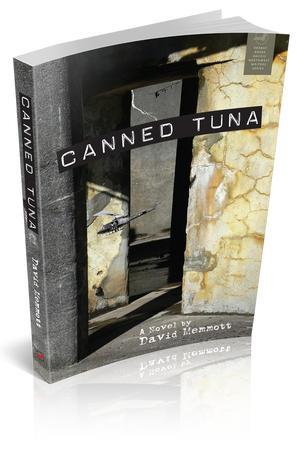“Through dark openings in the armor of his characters,
[ Memmott ] reimagines his ghosts until they become familiar.”
[ Memmott ] reimagines his ghosts until they become familiar.”
Additional Praise for David Memmott’s Writing
About PRIMETIME, a novel:
“Memmott is intent on examining deep epistemological and ontological issues concerning the way humanity fashions its own reality, but he embeds his questions in a captivating thriller…. This is philosophic SF at its best.”
—Paul Di Filippo, “On Books,” Isaac Asimov’s SF Magazine
About SHADOW BONES, a story collection:
“The tales…sing with powerful imagery that serves the dual purpose of old-fashioned storytelling and mythic symbolism.”
—Jeff VanderMeer, NY Review of Science Fiction
About THE LARGER EARTH, a cycle of poems:
“…Memmott has negotiated a place between literature and science fiction, a philosophical space from which begins to resonate a lyrical, original poetry.”
—Brian Evenson, Rain Taxi
|
The tale of two young men transported and altered by a foreign conflict, strands of alternate past and future are posed in counterpoint to a fragile reality in Canned Tuna. Highland Vietnam, the Treasure Valley of Idaho and the mouth of the Columbia River provide the materials for a gripping fugue of hope and dread, of the collective wounds of war and the healing power of community.
Praise for David Memmott’s Writing
About CANNED TUNA, a novel:
“The language is rich and still propels you through the story at top speed. I forced myself to put it down last night as I wanted to savor it a little longer. Compelling writing beautifully executed.”
— Misha Nogha, author of Red Spider White Web,
finalist for Arthur C. Clarke Award given for a debut science fiction novel We all carry the ghost of Vietnam. It lives in the American psyche. Vietnam doesn’t haunt only our soldiers, it is woven into the fabric of a nation. In Canned Tuna, two different characters, each in their own time, encounter the ghost of war. Both their lives are changed by something they see but cannot share. In the gulf between their two worlds lives a stark contrast between 1963 and 1969, between the ghost that threatens and the ghost that saves.
Nicolasa Bilbao sustains a serious head injury when his jeep hits a landmine. He is medically discharged. Back home in Boise in 1969, his head injury invites him into therapy at a V.A. clinic. The leader of his therapy group is an ex-Marine named Doc and they plan a hit on the governor. The unplanned outcome of their harmless guerrilla theater causes the group to fracture into factions, lining up behind different ideas of revolution. Milo Simonson’s late-adolescent blooming is put on hold by an inexpressible dread. The world around him is breaking down. A dark storm has stalled off the Oregon coast. His home town is experiencing some kind of time slip at the mouth of the Columbia River in 1963. His fragile reality brings him into an uneasy relationship with a mystery resurrected from a watery grave. How are they connected? Memmott stumbles into the ineffable in Canned Tuna. Through dark openings in the armor of his characters, he reimagines his ghosts until they become familiar, in the hope that one day he can learn to talk to them without fear. “We are all victims of some trauma, refugees from somewhere, touched by some form of violence,” he says, “We choose to suffer the greater/lesser ghosts of human imagination in our stories not because they are reality, but because they are removed from reality.” The novel’s tone is comic and exaggerated. His characters are part of a dream that awakens through tragedy. They represent real people who never thought of themselves as real. Their degrees of flaw give them character. “All my characters are composites, pieced together like Frankenstein. I don’t fully control them, but do have a lot of influence in making the way hard for them. That’s why I write, to make the way hard for my characters.” Praise for Canned Tuna
"The title of David Memmott's new novel, Canned Tuna (Redbat Books, trade paper, $16.00, 292 pages, ISBN 978-0-9971549-8-6), reminds me of the title of the 1964 novel by Charles Simmons, Powdered Eggs. I think this comparison is fitting, and maybe even indicative of a deliberate move on the part of Memmott, since his book is also set in the 1960s. But despite pages of gorgeous mimetic writing which evoke that era with grace and precision, overcoming simple nostalgia, Memmott's book is a fullblown fantasy, a weird road trip through a cosmically shattered landscape that summons up comparisons to Bruce McAllister's classic Dream Baby.
Two men, their ongoing lives offered in alternating chapters, pivot around each other in inexplicable orbits, until a bravura climax resolves their relationship, yet not without some tantalizing enigmas left over. Nico exists in 1969. A veteran wounded in Vietnam, he is back in his hometown of Boise trying to figure out how to live. He gets ensnared in the doings of a revolutionary group dubbed the P.A.S.T. Meanwhile, Milo exists in 1963, a young man working in a tuna-canning factory and focused mostly on trying to score some sex with his girlfriend Monica. Both men are subject to fantastical hallucinations and eruptions of alternate realities. But it is Milo's world which comes apart most dramatically, precipitating a final merger of identities. Memmott—a rare figure in our field, both a publisher (Wordcraft of Oregon) and an accomplished novelist and poet—manages to create an alluring personal voice for this novel which blends the vibes of Thomas Pynchon, Philip K. Dick, and Ken Babbs, whose Vietnam novel Who Shot the Water Buffalo?, should stand shoulder to shoulder with Canned Tuna. Memmott has given us a book which adds a trippy spin to Faulkner's famed observation about the undead past and its heavy hand." — Paul DiFilippo, Asimov’s Science Fiction Magazine (July-August, 2018)
"The stories of two young men during the Vietnam/counterculture era amid shifting realities, some fantastic truths emerge. The sort of book we need as history keeps getting stereotyped, then forgotten."
— Ernest Hogan, author of Cortez on Jupiter,
High Aztech, and Smoking Mirror Blues |
About the AuthorDavid Memmott has published six books of poetry—most recently, Lost Transmissions (Serving House Books, 2012), an Eric Hoffer Award finalist. He is a Rhysling Award winner, Spur Award finalist, Fishtrap Fellow, Playa resident and recipient of three Fellowships for Publishing from Literary Arts, Inc. (Portland), for his work at Wordcraft of Oregon. He serves as a consulting editor for Phantom Drift: A Journal of New Fabulism. His digital art can be viewed on his website, www.davidmemmott.com.
|



